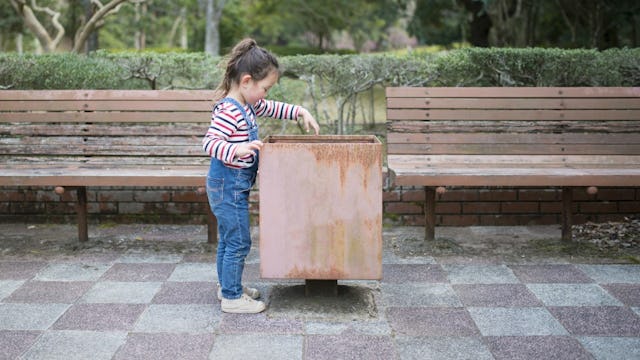We Need To Teach Our Children To Treat Public Places With Respect

Any time I go to a restaurant with my three kids, they know after the meal we are going to be stacking dishes, putting back the salt shakers and ketchup bottles, and checking the floor for debris. During some of our outings, the mess is minimal, but when you take three kids out to eat, they are going to leave their mark. But it’s not an excuse to trash the place, ever.
Our favorite restaurant serves fried green beans and has a shelf dedicated to kids — which is why it’s our favorite. It’s stacked with board games, coloring books and crayons, and before sitting down, we always grab Memory or Connect 4 so we can play while we wait for our food. But as soon as it comes, we clean up the game and it goes back on the shelf. No one wants to flip Memory cards over when they are greasy and stained with chipotle dipping sauce, and those games are meant for everyone to enjoy. We go there often and I want to feel welcome, so we clean up after ourselves.
Kids are kids, absolutely. But it’s our job to teach them public places are not theirs to destroy. They belong to everyone, and we need to be considerate and keep them clean, follow the rules, and do our part so that they, and others, can enjoy the privilege of using them.
No one wants to see sandwich bags floating around at the beach or the park. Trash needs to be thrown away or put in the recycling bin. They can start doing this as early as they can walk and carry something at the same time. I clearly remember this being such a revelation to all three of my kids. They loved walking around with something in their hands. They loved the praise they got when they put something in its place or threw something away. (One of my kids did this for hours, like it was the most fun game ever.)
We need to teach them to obey signs like “Do not enter” and “Danger.” They are there for everyone’s safety, and our curious kids are not exempt from the rules.
Toys at the doctor’s office, or the library, or the book store need to be cleaned up when they are done. It is a treat to have them, and we need to keep them nice for other kids to use, and to save the sanity of parents who haven’t slept in two days and would love to sit and flip through a magazine for a few minutes.
And if you knock a display over at a store or something falls off the shelf as you walk by, you pick it up. You don’t leave it for someone else to do — it’s called not being an entitled jerk.
Quick reminders are essential. On the way to the library, restaurant, park, zoo, or indoor gym, I always find a quick talk (versus a long lecture where kids shut down and stop listening) reminds them of the ground rules and that I expect them to comply. Libraries are not for trying out tap dancing or gymnastics, and we don’t start a game of tag in the grocery store. You leave a place the way you found it — or better. You must respect your surroundings and the property of others.
If we don’t teach our kids how to do this, who will? We all need to lead by example and show them how important respecting public property is, and it needs to start at a young age. Hopefully, this will make it a habit sooner than later, although these teachings are not a one-shot deal. We teach, then reteach, then reteach again.
To be honest, I have to remind myself when I see a child treating things with disrespect (sometimes my own) that it’s not always because they haven’t been taught how or they have irresponsible, asshole parents. Children are the ultimate testers, even very well-behaved kids. They are always pushing the limits. Their frontal lobes (the part of the brain that controls impulses) are not fully developed, and it’s the job of the parent to take control and show them the way. And it takes way more than a few times — it is constant. It is hard work, but it is worth it. It is necessary.
It’s showing them so much more than to just clean up after themselves. It teaches them empathy and compassion for others. It helps them learn the value of beautiful places, how to care for their environment, and that something can be taken away or ruined if it is not cared for properly. Most of all, it shows our kids the world is bigger than they are. There are other people in it who have feelings and deserve to utilize and enjoy public spaces as well, so we can’t allow ourselves to ruin that experience for them.
I’m not perfect, and sometimes ensuring that our children respect public spaces is a lot of freaking work, so I have been known to use rewards or bribes to keep my kids in line. And also, some days it is easier to hand them a phone or iPad and tell them to sit and not touch a damned thing — and I am not ashamed to admit that either.
This article was originally published on